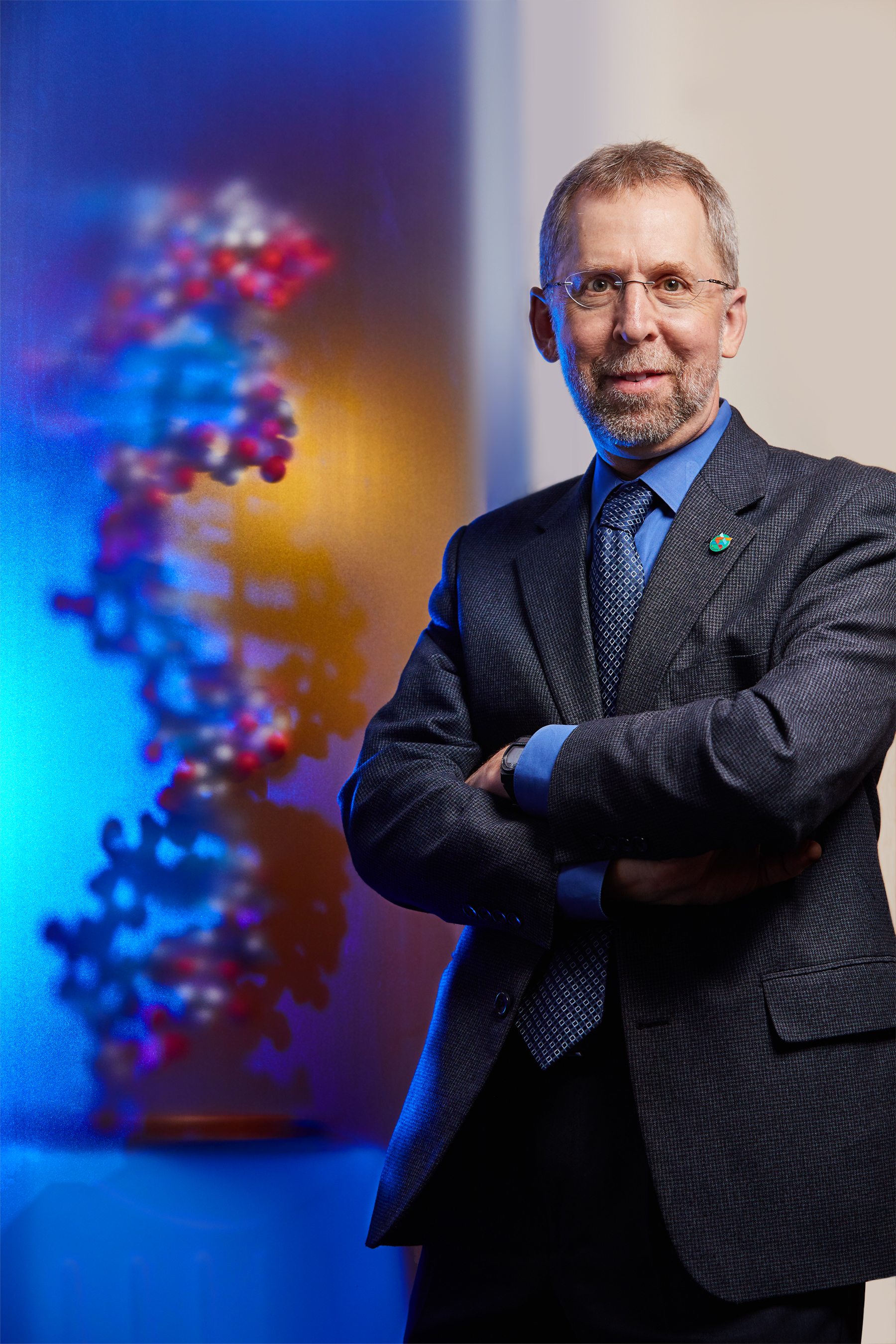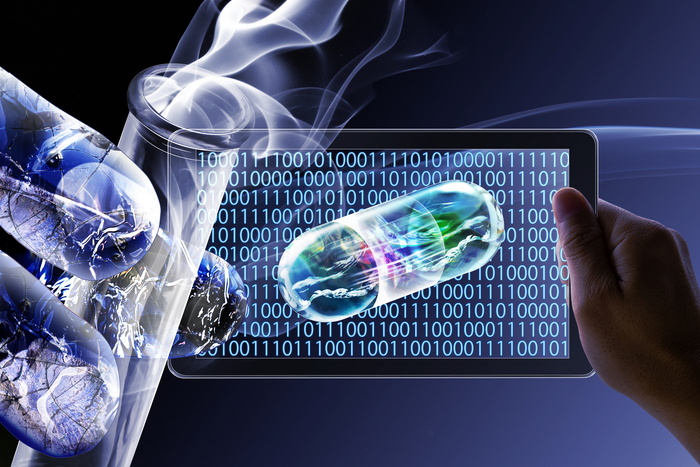Eric Green, Director of the US Human Genome Research Institute ERNESTO DEL AGUILA III III
Each of the people who reads these lines - and the rest of the planet's population who do not - carry a unique secret code.
It is a long combination of the same four letters, G, A, T, C repeated 3,000 million times and that summarizes all the information necessary for a human being to develop in the womb from a cell of its father and another from your mother, form a complete body, be born, grow and reproduce.
Within this sequence - the human genome - are some of the keys that determine whether we will live to meet our great-grandchildren or whether we will die young from cancer or if we reach old age we will forget who our children are due to dementia.
The key to one or the other future is found in some five million changes from one letter to another that typically differentiate one individual from another and that account for only 1% of their entire genome.
The remaining 99% is identical and shared among all humans on the planet regardless of their origin.
The year Eric Green earned his MD, a life-changing word was coined: "genomics."
It was 1987 and a short time later one of the greatest scientific projects in history began: trying to read the entire human genome for the first time and understand the secret keys that determine who will live a long and healthy life and who will get sick.
The international scientific project Green embarked on achieved the first draft of the genome 20 years ago.
To achieve this, the US created the National Human Genome Research Institute, a public body with some 500 scientists and a budget of more than 422 million euros.
Green, a 62-year-old doctor and molecular biologist born in San Luis (USA), has spent most of his career in this organization and has been its director since 2009.
Human genome sequencing changed biomedicine forever, and it promises to do the same with medicine and probably society as well, although it will take time.
For now we can read the sequence of letters that defines who we are.
Now it remains to understand its meaning to understand what will happen to us.
Ask.
When the first draft of the human genome was published in 2000, the president of the United States, Bill Clinton, said that it would be a revolution, that thanks to him it would be possible to know how the sick would evolve.
There were other experts who said it would allow creating babies on demand and knowing if someone would be a criminal just by reading their genome.
The current reality is quite different. What happened?
Answer.
I am always a bit embarrassed to hear some of the things that were said at that time.
There was a lot of hyperbole and exaggeration.
A lot of people were a little too euphoric.
It was a time of euphoria because the first draft had been completed when many thought it would be impossible, but I think that those of us who participated in the project and also politicians and presidents probably went a bit too far with expectations when using words like revolution or transformation .
It was exaggerated.
But on the other hand it is remarkable how far we have come.
It is very difficult to change medicine, but the fact that a patient enters a doctor's office without knowing what disease he has, some rare, rare disease and that you can sequence his entire genome and know what is wrong with him was science fiction in 2000. Nobody thought it would be possible because of the cost or because of the difficulty of interpreting the data.
We now know that it is affordable, understandable, and you can make it work to improve your treatment in 70% of the cases.
P.
The genome has helped a lot in the medicine of rare diseases, but not so much in the chronic diseases that kill the most such as cardiovascular or cancer. Why?
R.
Have we defeated cancer?
do not.
It is true that genomic medicine today cannot better treat and diagnose all types of tumors.
But now we understand cancer in a totally different way than before the human genome.
There are genetic markers that give us more information than physical parameters, such as in which organ the tumor is.
It was an earthquake.
Also think about prenatal genetic testing.
A routine analysis that alerts you to chromosomal abnormalities, such as Down syndrome in a fetus.
Now mothers only have to give a little blood to find out, not undergo the more invasive amniocentesis test.
Between seven and eight million women take the test each year.
There have been great changes.
But there are still many challenges in terms of the most prevalent diseases.
Genetic markers cannot yet tell us why someone has diabetes, hypertension, dementia, or mental illness.
It is a slow but steady process and I believe that in a few decades the way we classify and diagnose these diseases is going to change.
In 10 years, sequencing your genome will be as common as taking a blood test
P.
Physicists often say that they understand what the + of the universe is made of, the rest is unknown dark matter and energy. How much do we still do not understand about our genome and what is the main question that remains to be answered?
A.
We understand less than 5% of the complexity of our genome.
I think the biggest question left for us is to understand how his choreography works.
As the cells of our body choose from a relatively limited number of genes, we only have 20,000, to be what they should be and act as specialized cells of each organ.
What genes do they use, how much do they use them?
We thought that the complexity of the genome lay in the genes and their function, but now we see that the complexity is on the scorecard with all those switches and dials that turn genes on and off or regulate the activity of a modest number of them.
P.
Will it take only a few decades to understand that choreography?
A.
It is a multigenerational challenge.
The next generation will go a long way in our understanding of how the genome works, but not as much as the next.
We are faced with enormous complexity.
We should both be proud of all that we have learned and humbled by all that we have left to know.
Q.
The NHGRI has made 10 predictions of what genomic medicine will look like from 2030. What are your favorites?
A.
There is a clear prediction: that sequencing your genome is as common as getting a blood test.
The idea is that it is as necessary for doctors to know your genomic information as it is now to know your levels of red blood cells, for example.
There is a second, more risky prediction.
When we sequence a person's genome we find that they have between four and five million unique and personal changes from one letter to another in their genetic sequence.
Right now we have no idea what those changes mean.
Are they important for biology or for health?
Most of these variants are called "variants of unknown significance."
It would be wonderful if in the future there are computers and artificial intelligence systems capable of reading one of these variants and knowing if it is important, if it changes the functioning of that person's body and if it has consequences for their health.
You should only sequence your genome if you have a medical problem
Q.
Have you sequenced your genome?
A.
No. I am a strong advocate that you should only sequence your genome if you have a medical problem that you need more information about.
I am healthy and that is why I have had no reason to do so.
I would certainly do it if, for example, if I had cancer and my genome could reveal information about which medication would be more appropriate for me.
Q.
There are private companies that already offer this service. Does it make sense to pay for it?
A.
I do not discourage anyone from doing so, but I warn you that if you are healthy, the information you will get from your genome is based on very preliminary studies and we do not yet have solid knowledge that can help you from a medical point of view .
Q.
Do you think that doctors are prepared to handle genomes on a routine basis?
A.
Absolutely not.
The advancement of genomics has been so rapid that it has been impossible for everyone to keep up.
We must make a great effort to train doctors and the general population.
It is a challenge for the medical community.
I do not know what the situation is in Spain, but in the United States it is very difficult to even change the curriculum of the medical career to include genomics.
Q.
Are there dark aspects of the widespread use of our genomic information?
R.
Any technological advance is a double-edged sword;
it produces good things but it can also be used for evil.
Many medical advances are like this.
From very early on, genomics has been very concerned with legal, social and ethical implications.
There are potentially dark sides.
Genetic information is information.
Information is powerful and can be used for evil, just like your banking information or your medical history.
Each country is tackling this problem in its own way.
In the US we have a law against discrimination on genetic grounds.
There is a lot of concern about privacy.
But if we have been able to handle other types of information, including information about a patient's family history of colon cancer in a way that does not harm them, we can do the same with genomic information.
We simply must include the new genetic information and use the laws to protect it.
We want to use only the good side of the sword.
Q.
How much do you think knowing our genome can change our lives and knowing, for example, that we have a higher risk than normal of suffering from diseases without a cure, such as Alzheimer's?
There will be people who refuse to do so, right?
Q.
Knowing your genome is a personal choice.
No one can tell you how to act, it is you and only you who must decide.
Some will want to know and some will not.
It is something that already happens in some cases, especially with rare diseases.
There are also people who sequence the genome but tell their doctors that they want to know everything except about some specific diseases.
People should be able to use their genomic information in whatever way they feel most comfortable.
In the next decade there will be many healing therapies with CRISPR, especially of rare diseases
Q.
We have recently experienced another scientific revolution, that of gene editing with tools like CRISPR.
What do you think of the lights and shadows that this technique can bring?
A.
With CRISPR we have seen both edges of the razor in the last two years.
Genomic editing is an incredibly powerful scientific tool.
It has transformed the study of the genome.
But we've also seen egregious use in the case of babies created in China in an experiment that should never have been done.
It was unethical, inappropriate, or scientifically backed.
On the other hand, we have seen how CRISPR cured sickle cell anemia.
There are now several clinical trials trying to cure blood diseases by modifying the genome of blood cells in the bone marrow.
You take them out, edit their genome, and inject them again.
It is potentially curative.
For other ailments in organs such as the brain this may be much more difficult, but perhaps possible.
Another of our predictions is that in 2030 there will be many curative therapies with CRISPR, especially of rare diseases.
Q.
Do you think we will also see babies designed with CRISPR and human embryo experiments?
R.
I hope not.
It is inappropriate.
We are not prepared for that because we do not understand all the complexity of these types of experiments or their consequences.
And of course we should not use them for aesthetic or physical issues, just to cure diseases.
Embryo gene editing is in fact so far from being a reality with complete safety and control that we should not think much about it.
We need a global pandemic surveillance system and we have the technological capacity to do so thanks to genomics
Q.
Are you religious?
Do you think that we play God with these kinds of experiments or that we have become our own gods?
A.
I am not religious.
I see this from an evolutionary point of view.
I think we are very fortunate to be the only species on this planet that has managed to read and study its own genome.
I don't think we play god by understanding our genome or editing it.
What we do in genomics is no different from other scientific and medical advances such as the discovery of antibiotics or the many ways we know of relieving pain and suffering with drugs.
Q.
At the moment our world is threatened by a viral genome much smaller than ours that has unleashed a pandemic. Could we have done better as a species in our fight against it?
R.
As a world we have done it fatal.
To begin with, we should have invested a lot more in science that could have helped us to be better prepared.
I hope we come out of this with the lesson learned: we need good surveillance systems for new pandemics.
There is another big problem: people who don't believe in science.
I have a hard time understanding it.
There are people who do not want to be vaccinated.
There are people who think that masks are useless.
There are bright things too like the record time in which vaccines were developed.
From a genomic point of view, it took just hours to sequence the entire genome of the virus.
20 years ago it would have been impossible.
There have been good things but as a species we should not be proud of how we have done it.
There have been many, many governmental and programmatic and social failures.
The pandemic has divided us and this has made things worse.
Q.
How can we be better prepared for the next pandemic?
R.
For a long time there has been talk of creating specific centers for constant surveillance, especially in regions of the world where we know that viruses jump from one species to another.
We need a global pandemic surveillance system and we have the technological capacity to do so thanks to genomics.
This will allow us to hunt down pandemic viruses much earlier.
I think that in the next five years we are going to talk a lot about this.
Q.
When do you think we will return to normal?
A.
I am not an expert and I have no idea.
It will depend on factors that we do not know: we do not know the potential of the new variants of the virus, or how much resistance there will be globally against vaccination, not even if the logistics will allow there to be enough vaccines, or how the new normal.
I hope it will arrive in about six months or a year but there is enormous uncertainty.
Q.
How has the change in the presidency of your country influenced you?
A.
I have worked for almost 27 years at the National Institutes of Health.
I have served under Clinton, Bush, Obama, Trump, and now Biden.
I can tell you that each one is different.
Some like to get into science more than others, talk more with scientists.
They have obviously taken very different positions on scientific questions.
What I see is that Biden is very clearly in favor of science, very interested in it and seems very determined to know how he can improve the scientific system.
Proof of this is that your main scientific advisor will be Eric Lander, an exceptional geneticist.
It is the first time that an expert in biology has held that position.
I think we are going to see a new energy, but we will have to see.
You can follow MATERIA on
,
and
, or sign up here to receive
our weekly newsletter
.







/cloudfront-eu-central-1.images.arcpublishing.com/prisa/XAJ562JJQVDU3PYD6NN72OA2WM.jpg)







